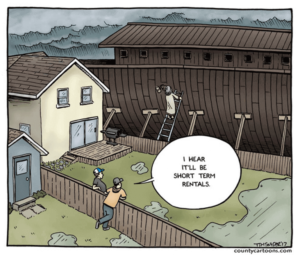
Short-term rentals are a big business. In 2017 there were over 8 million internet searches for short term rental properties, over 30 million short term rental guests, and over 2 million short term rental listings.
This booming enterprise of short term rentals has brought added income to homeowners, their communities, and, in many instances, has increased marketability as both buyers and sellers view short term rentals as a potential source of income. However, this expanding market has also acutely brought to the foreground instances of renters damaging or putting added strain to the common areas, violating community rules, or acting in a way that is a nuisance to the community. Ultimately, given that short term rentals are here to stay (along with their accompanying benefits or burdens), it is important to have a basic understanding of the legal landscape that regulates short term rentals to best embrace or protect against their impact in your community.
State Law
In 2017, the Utah State Legislature passed Utah Code Section 10-8-85.4, which prohibits a municipality from enacting or enforcing an ordinance that prohibits an individual from listing or offering a short term rental on a short term rental website, or for fining or otherwise punishing an individual solely for the act of listing or offering a short term rental on a short term rental website.
In sum, this section makes it much more difficult for municipalities to enforce short term rental restrictions, as the easiest and most efficient way to determine if someone has or is intending to rent their home as a short term rental is by looking to see if they have posted a listing online.
Although this section does not directly impact an association’s ability to regulate or police rentals in its community, it does make it more difficult for associations to simply rely on municipalities to take the laboring oar in enforcing rental restrictions in their area.
Local Ordinances (St. George, City)
In addition to state law, local ordinances can impact whether short term rentals are allowed in your community. For example, in the city of St. George, short term rentals are prohibited unless a short term rental: (1) meets short term rental project requirements; or (2) meets individual residence requirements. The local requirements for both short term rental projects and for individual residences can be found in Section 10-14-21 of the St. George City Code. Being familiar with your local ordinances is key to navigating short term rentals in your community.
Association Restrictions
In addition to state and local law, homeowner associations (through their governing documents) may also have rules and restrictions regarding short term rentals. It is important for associations to review their governing documents to determine if their current documents support or hurt the association’s goals and objectives. For example, associations often assume that provisions such as “no lot shall be used except for single family residential purposes”, or “no lot shall be used for commercial purposes”, act as a ban on short term rentals. However, cases throughout the country have been reluctant to view such language as sufficient to restrict short term rentals. (See Santa Monica Beach Prop. Owners Assn., Inc. v. Acord, 219 So.3d 111 (Fla. 1st Dist. App. 2017) (citing to 14 other court decisions from various states regarding the nature of a property’s use is not transformed from residential to business simply because the owner earns income from rentals).[1] Therefore, associations should determine if and to what extend they would like to permit short term rentals within their communities and conduct a careful review of their governing documents to verify that said documents support the association’s goals and objectives.
Moving Forward
Whatever your personal feelings on short term rentals, they remain, for the foreseeable future, an integral element of the housing market. Therefore, associations and communities should be aware of local and state laws governing their use, along with their own governing documents to prepare and plan the best way to embrace or restrict their use. If an association needs to modify or amend its governing documents to better address short term rentals, Utah Code Section 57-8a-209 allows homeowner associations to implement or modify rental restrictions within their communities. Furthermore, Utah Code Section 57-8a-218 allows homeowner associations to implement rules that require tenants to abide by the terms of the governing documents and allow associations to hold tenants and lot owners jointly and severally liable for damage caused to the common areas and facilities. Moreover, hosting platforms, such Airbnb have created property management tools to help homeowner associations create and monitor home share frequency limits, access to a neighborhood hot-line to report nuisances, or receive alerts if a listing is created at an address within the community. These and other tools, if properly implemented, will allow short term rentals to have a positive impact within your community.
[1] See Vera Lee Angel Revocable Trust v. O’Bryat, No. CV-16-1041, 537 S.W.3d 254 (Ark. Feb., 8, 2018) (holding that short term rentals did not violate the CC&Rs residential purposes or commercial purposes restrictions as the CC&Rs were silent regarding any specific restrictions on rentals or short term rentals); but see, Edwards v. Landry Chalet Rentals, LLC, No 51,833-CA (La. Ct. App. Feb. 28, 2018) (finding that short term rentals did violate the CC&Rs residential purposes or commercial purposes restrictions.) Ultimately, the more specific the language in an association’s governing documents (either prohibiting or allowing short term rentals), the more likely an association will obtain the desired result if the matter is challenged and brought before a court. See Vera, 537 S.W.3d at 258.

